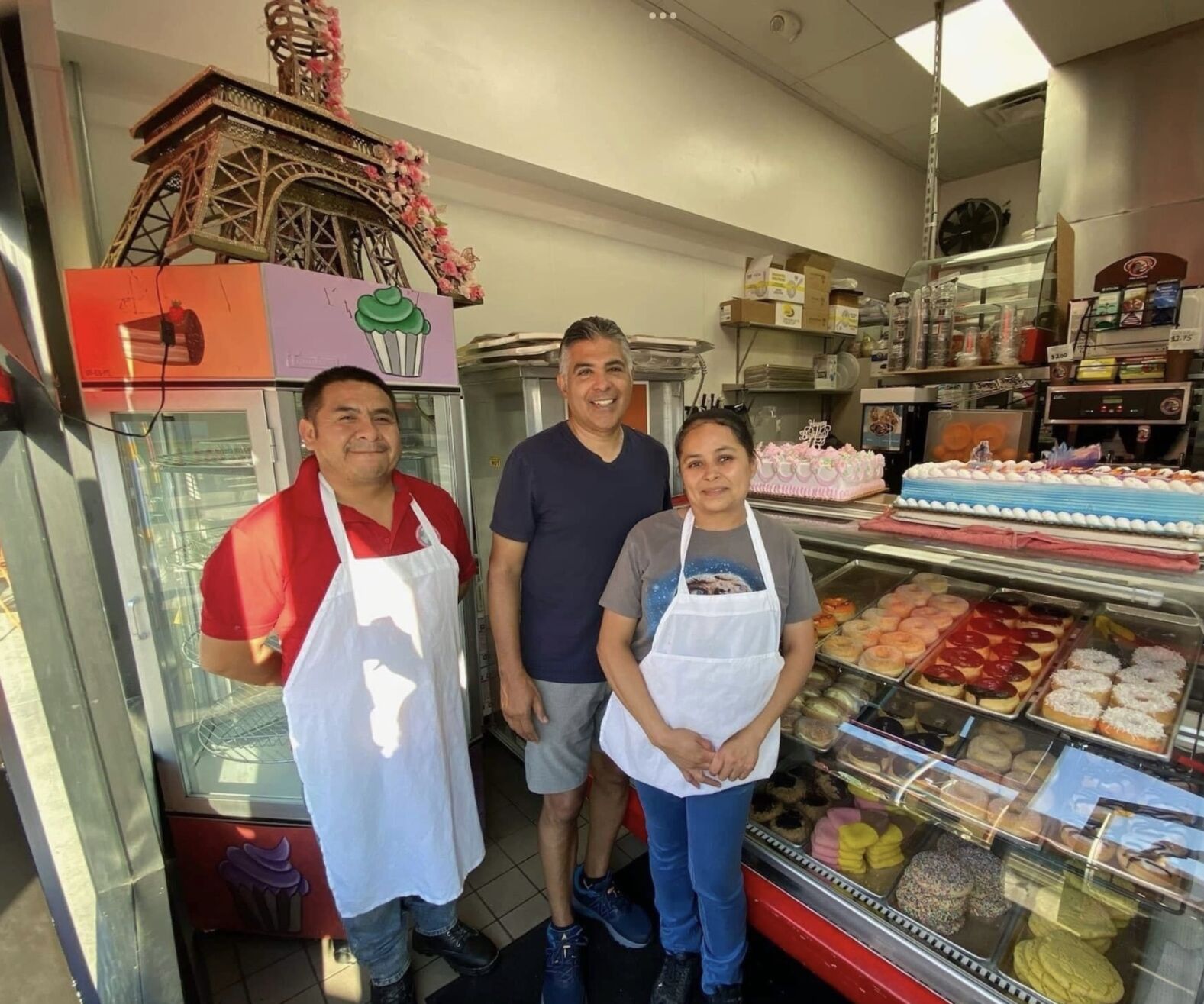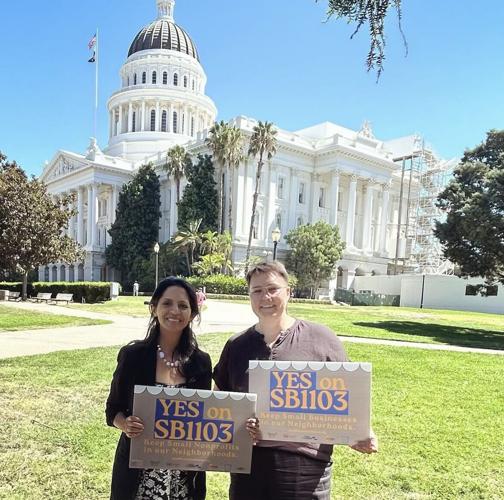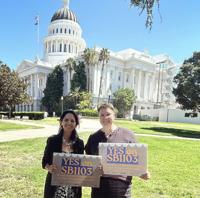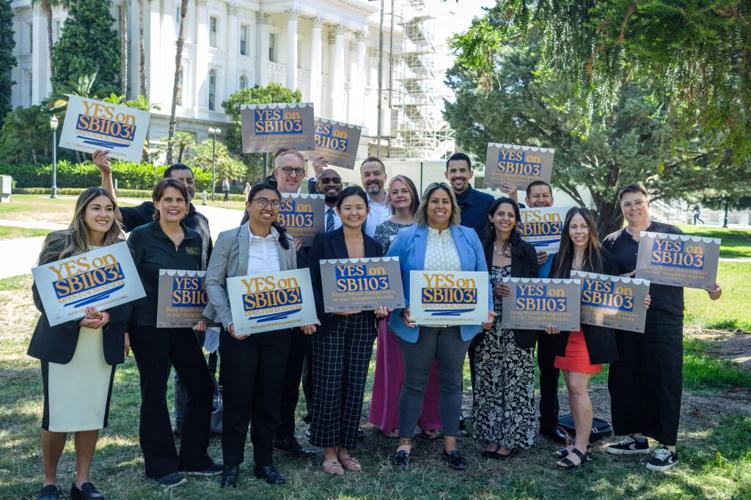
Faustino Perez and Maria Lopez Perez with a customer at the old bakery shop. Photo courtesy of Faustino Perez
The Perez family began selling their cakes and baked goods from their home, so when the opportunity came to rent a small commercial location in Van Nuys Blvd., the family felt like their hard work was finally paying off.
In the summer of 2019, Faustino Perez and Maria Lopez Perez, along with her children, opened their small business in Panorama City, a neighborhood in the City of Los Angeles. After hard work, lifelong savings and community support, the family opened Todos Los Pastelitos Caseros, a donut and cake shop.
Although they were business-driven, had community support and enough monetary investments put into their business, there was one thing that the family did not plan for: the COVID-19 pandemic. “The pandemic was so unprecedented,” Faustino Perez told CALÒ News. “We had opened a few months before the closure of most things and that made everything so much harder.”
The pandemic left a devastating impact on the family’s business, which for years they have desperately tried to recover from.
But this July, five years after their doors welcomed their first customers, the Latino-owned small business was forced to shut down and with the closure, the dream of owning their own business was also gone.
In June, the family received a 30-day eviction notice from the owner of that building. The landowner was terminating their five-year lease, citing late rent payments, giving them no option to renew and asking them to turn in their keys in a month. “When we got that letter, we felt devastated. We were economically and emotionally very devastated,” Faustino Perez said.

Faustino Perez and a Kobe Bryant cake made by him. Photo courtesy of Faustino Perez
With just 30 days to close down, shut down all operations and fully vacate, the family struggled to terminate their five-year business in a month. “That was not enough time,” Faustino Perez said. “We had very large machines for baking. Since we had very little time, we sold some of our equipment at a very low price; some of them we gave away, and others we simply lost. We didn’t have enough time to take it out or find a new home for them and renting a storage unit was not an option because it was money that would add up and money we did not have.”
As commercial tenants, the Perez family found the experience very difficult to navigate. With limited English proficiency, the family also encountered complex commercial lease agreements that were difficult to navigate. In more than one instance, the family often received legal documents or notices in English. Yaneth Perez, one of their children, would often help with translation. “For us, understanding is very limited and we can speak a bit of English, but not a lot and [language] is different in legal documents than when speaking it informally,” Faustino Perez said.
A bill, which if passed, could protect small business owners like the Perez family, may soon be on Governor Gavin Newsom's desk.
The Commercial Tenant Protection Act,Senate Bill 1103 (SB 1103), introduced by Senator Caroline Menjivar, representing the San Fernando Valley, aims to protect microenterprises, defined as businesses with less than five employees,), restaurants with fewer than 10 employees and nonprofit organizations with fewer than 20 employees.
Ritu Mahajan Estes, directing attorney at Public Counsel, one of the organizations that are part of the Small Business Alliance for Equitable Communities cosponsors of the bill, said some of these protections already exist for various consumer contracts and residential leases but not for commercial leases or people that are commercial tenants.
SB 1103 tackles language justice by requiring commercial contracts or leases to be provided in the languages in which they were first negotiated, whether that is Spanish, Korean, Vietnamese, Chinese or Tagalog.
“We want tenants to understand what they're signing. We want them to understand their rights and their obligations under the lease,” Mahajan Estes said. “In many ways, this is also beneficial to landlords, because if tenants don't understand their lease, then they're not likely to be able to comply, and as a landlord, if your commercial tenants are not meeting their obligations, then you’re forced to evict them and bring in someone new, which is also hard work.”
The bill also introduces transparency in building operating costs, often known as “maintenance fees,” which can include expenses for common area maintenance or building innovations. It will prohibit property owners from giving tenants surprise bills without adequate explanation of how the money is being used or noticed prior.

(left) Ritu Mahajan Estes, directing attorney at Public Counsel and a colleague in the state's capitol advocating for SB 1103.
“These are fees that the landlord incurs to maintain the property or to maintain the building. They often cover stuff like landscaping, maintenance, security or property tax insurance,” Mahajan Estes said. “The way it works today is that landlords can ask tenants to pay for those costs. but there's no transparency. So a landlord can come one day to a tenant and say those fees that they pay every month have gone up by 80% and the tenant today has no right to ask them for documentation or proof that those costs have really gone up or are being used properly and adequately.”
Mahajan Estes said the new regulation leaves no space for fraud or ambiguity. “The bill is saying that your landlords can still charge you for these building operating costs, but they need to give you the backup documentation before they expect you to pay those costs. And they need to be very clear about how they're calculating those costs. If your landlord doesn't comply with this piece of the bill, then you have a right to sue them,” she said.
In addition, the bill also extends notice periods for rent increases and evictions when it comes to commercial leasing. The bill would require landlords to provide at least 90 days’ notice before eviction or any rent increase, even on month-to-month leases.
“[SB 1130] says if your rent's going to be increased more than 10%, your landlord has to give you 90 days' notice of it, and not just 30 days like the current law says,” Mahajan Estes said. “These extra months make a huge difference. It gives people a little more time to figure things out. Maybe they can acquire a loan, maybe they can ask for assistance from friends and family, or they can revamp their business model to make more income. Or maybe in those 90 days they can find another location near where they are now, so they don't have to forcefully be displaced from the community the business has already been part of.”
Faustino Perez and his family wished they had more time to see if there were other ways they could’ve kept their business afloat.
”The five years that I worked with my parents are our shop … they were the most beautiful years despite everything," said Yaneth Perez.
Today, two months after they closed their business, most of the Perez family remains unemployed and have been left to pawn some of their remaining material from their shops to get by.
Another small business owner in Los Angeles is Abby, who, along with her husband, began a professional music production business. For 20 years, Abby and her husband have worked closely with musicians, helping them with the music production side, whether that is renting out their equipment or helping record their music, among other things.
Abby, who wanted to keep her last name and her business identity undisclosed, said she was extremely proud of her business, which has continued to grow for more than two decades now. Since they began their small business, the couple did not have any external investors. “We knew that we were each other's teammates, and we didn't want the complications of taking on anyone else,” Abby said. “We’ve lived pretty modestly to be able to make this happen.”
Abby’s husband died last year, and despite that, she wants to continue to keep her business alive, even if some months are harder than others.
In 2010, after their business and equipment started growing, Abby and her husband decided to take their family business into a commercial location, a building with more than 20 small businesses.
”We ran out of room in our house, so we started leasing the current space we're still in right now,” she told CALÒ News. “We signed a commercial lease, and we took this leap of faith.”
Abby said she would later discover how signing a commercial lease is nothing like signing a residential tenant lease, as little protections were offered. “I feel like we're 100 years behind residential leases at this point,” she said.
For Abby, things began to go downhill six years ago when the building got a new owner.
In the last couple of years, Abby said, not only has the rent increased but the operating costs and maintenance fees have also escalated to alarming amounts. The portal where she electronically submits her rent patent every month also contains new operating and maintenance fees. “It makes it impossible to budget or even feel good about our growth because we do not know what other expenses I will be hit with next month,” she said.
Abby, who has been an ambassador for other small businesses in the commercial building, said other tenants are also growing suspicious of the growing maintenance fees since no receipts or paper trails of these costs are provided to them. She said tenants' insurance has doubled in price, and other expenses like building management fees and costs for landscaping have also increased in the last year. “Our landscaping is dry dead brush and planters that are basically dirt and weeds. So what are we truly paying for? Where is that money going?” she said.

Caroline Menjivar (center) and community organizers in Sacramento. Photo courtesy of Ritu Mahajan Estes
Abby said AB 1130 is not the ultimate solution but the start to more protection for commercial tenants. “With this bill, landlords will know that they're going to have to be more transparent about the cost of maintaining charges. I think it's going to reduce fraud and I think that they're going to be a little more careful in hopefully making sure that estimates for costs are correct, so small businesses don't get hit with these nasty surprises,” she said.
If passed, it would be the first state law in the U.S. to give such protections to small business renters, many of whom are Latinos.
“Small business entrepreneurship is a vital avenue for economic mobility for many in my district and across California,” said Menjivar. “Their storefronts contribute to the aesthetics and vitality of our business corridors and increase the walkability and cultural representation within neighborhoods.”
Latinos dipping their feet into the small business world are growing and with that, the demand for protections as well. In 2023, the Small Business Administration (SBA) backed more than 7,300 loans to Latino-owned businesses. The number of immigrant entrepreneurs is also growing. In 2023, 17% of new business owners were born outside the U.S., according to Gusto’s 2024 New Business Formation survey of 1,300 entrepreneurs who started businesses in 2023.
“Small businesses and nonprofits play a huge role in our economy,” Mahajan Estes said. “They are huge economic generators; they create a lot of jobs, and they bring money into communities. Business owners not only make money right from customers who come in, but they also spend the money in the community. It's time that they are valued the way they should be.”
The Perez family is still looking for work and they hope to open another bakery shop in the future after they have economically recovered from the closing of their last shop. “Having your own business is possible for anyone out there willing to take that step. Sure, there will be tough times and things that might not work out but taking that leap of faith is worth it,” Faustino Perez said.
Abby has continued to be an ambassador for the other commercial tenants who also reside in the same building as her business. She hopes the passing of AB 1130 brings more transparency to her commercial lease and the property maintenance fee.
If passed, Newsom has until September 30 to sign the bill into law or veto it.
















(0) comments
Welcome to the discussion.
Log In
Keep it Clean. Please avoid obscene, vulgar, lewd, racist or sexually-oriented language.
PLEASE TURN OFF YOUR CAPS LOCK.
Don't Threaten. Threats of harming another person will not be tolerated.
Be Truthful. Don't knowingly lie about anyone or anything.
Be Nice. No racism, sexism or any sort of -ism that is degrading to another person.
Be Proactive. Use the 'Report' link on each comment to let us know of abusive posts.
Share with Us. We'd love to hear eyewitness accounts, the history behind an article.